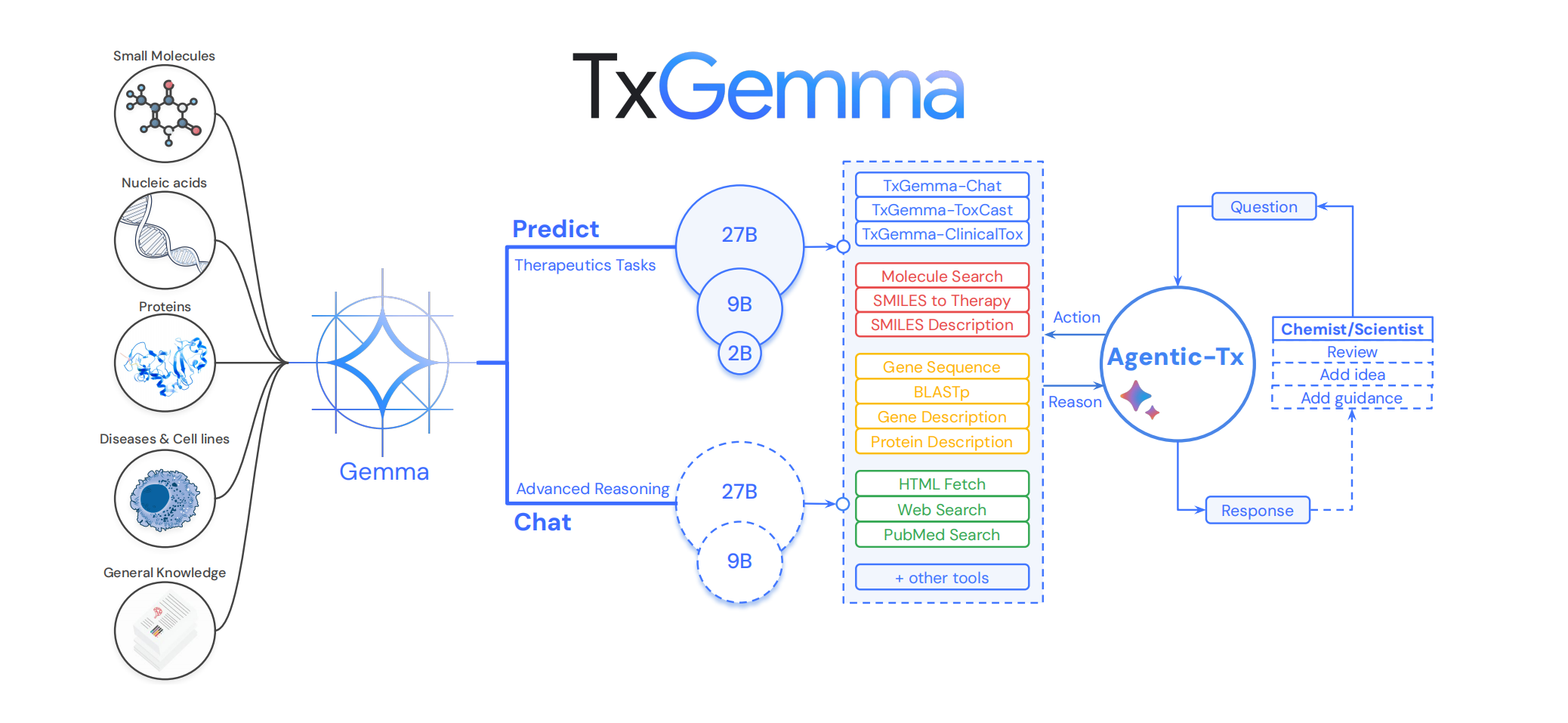Table of Contents
Overview
In the ever-evolving landscape of AI-powered drug discovery, a new player has emerged, promising to accelerate therapeutic development. TxGemma, a suite of open-source language models from Google DeepMind, is designed specifically for the complex challenges of the pharmaceutical industry. Let’s dive into what makes TxGemma a potential game-changer for researchers and scientists.
Key Features
TxGemma boasts a range of features tailored for therapeutic applications:
- Models available in 2B, 9B, and 27B parameter sizes: Offers flexibility to choose the right model size based on computational resources and task complexity.
- Fine-tuned for therapeutic tasks: Specifically trained on biomedical and chemical data, making it highly effective for therapeutic-related predictions and analyses.
- Supports property prediction and data analysis: Enables accurate prediction of molecular properties and efficient analysis of complex biomedical datasets.
- Conversational capabilities for scientific discussions: Facilitates interactive exploration of research questions and hypotheses through natural language interactions.
- Accessible via Hugging Face and Vertex AI: Provides easy access and integration into existing research workflows through popular AI platforms.
How It Works
TxGemma models are designed to process inputs related to therapeutic entities, such as molecules and proteins. By analyzing these inputs, the models predict properties and outcomes relevant to drug discovery. This involves training the models on vast datasets of chemical structures, biological data, and clinical trial information. The models can then be integrated into research workflows to assist in tasks ranging from target identification to clinical trial simulations, ultimately accelerating the drug development process.
Use Cases
TxGemma’s versatility makes it suitable for a variety of applications in the therapeutic development pipeline:
- Drug candidate assessment: Predicts the efficacy and safety of potential drug candidates based on their molecular properties.
- Molecular property prediction: Accurately estimates key properties of molecules, such as solubility, bioavailability, and toxicity.
- Clinical trial outcome estimation: Provides insights into potential clinical trial outcomes based on patient characteristics and treatment regimens.
- Biomedical data analysis: Efficiently analyzes large biomedical datasets to identify patterns and correlations relevant to disease mechanisms and treatment strategies.
- Interactive research assistance: Enables researchers to engage in conversational interactions with the AI to explore research questions and generate hypotheses.
Pros & Cons
Like any tool, TxGemma has its strengths and weaknesses. Let’s break them down:
Advantages
- Open-source and customizable, allowing researchers to adapt the models to their specific needs.
- Specialized for therapeutic applications, providing more accurate and relevant predictions than general-purpose language models.
- Supports both predictive and conversational tasks, offering a comprehensive solution for various research activities.
Disadvantages
- Requires domain expertise for effective utilization, as users need to understand the underlying scientific concepts and data.
- Performance dependent on the quality of input data, meaning that inaccurate or incomplete data can lead to unreliable predictions.
How Does It Compare?
When considering AI tools for therapeutic development, it’s important to understand how TxGemma stacks up against the competition.
- BioGPT: While BioGPT focuses on biomedical text generation, it lacks the specialized therapeutic prediction capabilities of TxGemma.
- MolBERT: MolBERT offers molecular property predictions, but it doesn’t include the conversational interfaces that TxGemma provides for interactive research.
TxGemma distinguishes itself by combining specialized therapeutic prediction capabilities with conversational interfaces, offering a more comprehensive solution for researchers.
Final Thoughts
TxGemma represents a significant step forward in AI-powered drug discovery. Its open-source nature, specialized therapeutic focus, and versatile capabilities make it a valuable tool for researchers seeking to accelerate the development of new therapies. While domain expertise is necessary for effective utilization, the potential benefits of TxGemma are undeniable. As the field of AI continues to advance, tools like TxGemma will undoubtedly play an increasingly important role in shaping the future of medicine.
